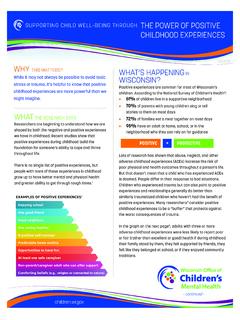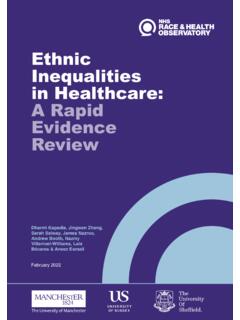Transcription of SUPPORTING CHILD WELL-BEING THROUGH COVID-19 GRIEF
1 SUPPORTING CHILD WELL-BEING THROUGH COVID-19 GRIEF . WHY THIS MATTERS FEB 2022. From deaths of loved ones to loss of rituals and routines, WHAT'S HAPPENING IN. children and youth have experienced many types of loss during WISCONSIN?3. the pandemic. Attending to a young person's GRIEF helps them Fortunately, based on the most recent state heal and become healthier and resilient moving forward. estimates ( THROUGH June 2021), Wisconsin has one of the lowest rates of COVID-19 . orphanhood in the nation. WHAT THE RESEARCH SAYS. As of December 2021, an estimated 167,000 children had lost Nevertheless, as of June 2021, an estimated either a parent or a caretaking grandparent to COVID-19 , with rates 1,098 Wisconsin young people had lost highest among children of Many more have seen a parent, a parent or caretaking grandparent to grandparent, or other loved one become seriously ill or become COVID-19 . debilitated by acute or long covid .
2 No racial or ethnic group has been free In a small national survey, two-thirds of high school teachers or of such losses. Most of the children who staff expected student bereavement to have an impact on learning have lost a caregiver in Wisconsin are this school At the same time, almost half of the teachers or White (60%), because most of Wisconsin's staff surveyed (44%) said their school was extremely prepared children are White. But Wisconsin's to help students deal with GRIEF due to loss of a loved one, and 84% children of color have lost caregivers at were at least somewhat prepared. disproportionately high rates. LOSS OF PRIMARY CAREGIVER PER 100,000 CHILDREN3. 400. 350. 324 NM (HIGHEST). 300. 0 - 100. 250. 101 - 200 200. 150. 201 - 325. 100 86 WI. 50 61 NH & HI. (LOWEST). 0. - continued - SUPPORTING CHILD WELL-BEING THROUGH . continued from page 1 COVID-19 GRIEF . COMPARED TO WHITE CHILDREN OTHER WISCONSIN. CHILDREN ARE - TIMES AS LIKELY TO HAVE.
3 LOST A CAREGIVER TO COVID-19 . White RECOMMENDATIONS6, 7. PARENTS/CAREGIVERS: Hispanic or Latino Talk about the loss. Listen to your CHILD and let them talk about their feelings. Validate their Asian experiences. Help them feel calm. Black or Use routines to help establish a sense of African American normalcy. American Indian or Alaska Native Seek professional help if needed. SCHOOLS: Educate staff about CHILD and adolescent GRIEF . OTHER FORMS OF GRIEF OR LOSS Provide supports to bereaved students. Most Wisconsin children have not had to cope with the Promote universal social emotional learning and monumental loss of a parent or caregiving grandparent. Nearly trauma-sensitive strategies. all children, however, have had other reasons to experience some Support teachers' WELL-BEING so that they have form of GRIEF or loss during the pandemic. This can include loss the ability to support students. of routine, rituals, social connections, and a sense of physical or economic safety.
4 POLICYMAKERS. Expand mental health resources THROUGH support for telehealth, student services professionals in Research from other pandemics and disasters shows that even schools, and school-based social emotional children who do not experience a close death may become learning and mental health programming. overwhelmed if the situation leads them to have unaddressed Support funding for children who lost a caregiver feelings of powerlessness, social stigma, and disconnection. to COVID-19 , such as the proposed covid - That's why it's important for adults to recognize signs of this type Bereaved Children's of distress in children and young people, even if those signs look very different for children than for adults, or if adults don't think COMMUNITIES. children are very aware of losses around Provide spaces and rituals for bereaved families to gather, and for others to support them. From the outside, experiences of GRIEF and/or trauma don't always Create opportunities for youth to interact with look like sadness.
5 They can also look like inattentiveness, acting other supportive adults in the community who out, physical symptoms such as stomach aches, or refusal to go can get to know them and provide a listening ear to places or engage in activities that trigger the or opportunities for fun. REFERENCES: 1. Treglia et al. (2021) Hidden Pain: Children Who Lost a Parent or Caregiver to COVID-19 5. National CHILD Traumatic Stress Network. ( ) Helping School-Age Children Cope and What the Nation Can Do About It. The covid Collaborative. Also Hillis, S. et al. with GRIEF . (2021) COVID-19 -Associated Orphanhood and Caregiver Death in the United States. GRIEF -tips-caregivers Pediatrics. 6. Albuquerque, S. and Santos, AR. (2021) In the Same Storm, But Not on the Same 2. Morgan Stanley Alliance for Children's mental health . (2021) A Return to Boat: Children's GRIEF During COVID-19 . Frontiers in Psychiatry, 12: 638833. School: Educators Assess mental health Concerns for Teens.
6 Https://www. 7. Surgeon General. (2021) Protecting Youth mental health : The Surgeon General's Advisory. pdf. 3. Hillis et al 2021. 8. Treglia et al. (See endnote 1). 4. Meherali et al. (2021) mental health of Children and Adolescents During COVID-19 and Past Pandemics: A rapid Systematic review International Journal of Environmental Research and Public health , 18: 3432.





